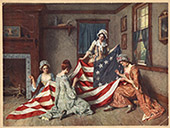Libraries, University of Nebraska-Lincoln
ORCID IDs
Document Type
Archival Material
Date of this Version
1793
Abstract
“Who served as a Soldier in the Western Army, in the Massachusetts Line, in the Expedition under General HARMAR, and the unfortunate General St. CLAIR. Containing An Account of his CAPTIVITY, SUFFERINGS, and ESCAPE from the KICKAPOO INDIANS. WRITTEN BY HIMSELF, And published at the earnest Importunity of his Friends, for the benefit of AMERICAN YOUTH.”
This is a spurious captivity narrative that enjoyed much popularity in the mid-1790s and was thereafter incorporated into the “canonical” body of accounts of white imprisonments, tortures, sufferings, and escapes from the Native Americans.
The narrative tells the story of “Jackson Johonnet,” a young man of 17 who leaves his family’s farm in Falmouth, Massachusetts (now Maine), to seek his fortune in Boston. Unable to get work, he falls prey to the wiles of an army recruiter, enlists, and is despatched to the “West” (in this case Ohio) to serve with the army. He is almost immediately captured by Indians, taken to their villages on the upper Miami, and witnesses the torture and death of fellow captives. He escapes with an associate and makes his way back to the army in time to participate in the notorious and disastrous battle known variously as the Battle of the Wabash or St. Clair’s Defeat. Numerous points in the narrative contradict established facts in the history of the 1791 campaign, and other events seem to be embellishments supplied by someone unfamiliar with the western geography or actualities of Indian warfare.
The work was first published in Beers’s Almanac and Ephemera … for 1793, and it proved exceedingly popular, spawning at least eight reprint editions in the following two years. Its publication followed two years of unsuccessful military campaigns against a coalition of Native Americans in Ohio, led by Little Turtle and Blue Jacket, that included Miami, Shawnee, Kickapoo, Piankashaw, Wea, and Delaware tribes. The Northwest Territory was rendered unsafe for settlement, and President Washington and Congress were endeavoring to increase the standing army and provide for defense of the frontier. The “Johonnet” narrative packed much action and adventure in a relatively short space, and its portrayal of the Indians served to justify the efforts for the military conquest of their territories then under preparation.
False and trumped-up allegations invented to justify a military invasion!—Americans of the twenty-first century should count themselves fortunate that nothing of that sort could ever happen today.


